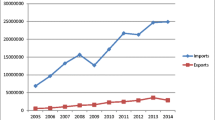Abstract
Coinciding with the rise of Chinese economy, China’s foreign policy has become more assertive than ever. As part of the “Chinese Dream” promise, her new projects, the “New Maritime Silk Road” and the “New Silk Road,” have created a new chapter of China’s relations with her neighboring countries as well as the international communities. However, China’s hidden agenda of the two new projects, her challenges of achieving her goals, and how the international communities respond to the increasingly assertive Chinese foreign policy are yet to be discussed extensively among research on international relations. This introduction seeks to outline a wide spectrum of theoretical framework that is applicable to the subject and to highlight the importance of understanding the context of China’s strategic shifts in Xi Jinping’s era.
Similar content being viewed by others
References
Yazhou Ziyou Diantai (Radio Free Asia). (2014, March 17). Xi Jinping zaitian yi zhiwei biancheng jiubadao, geren jiquan chaoyue Deng Xiaoping huocheng Zhongguo Pujing (Xi Jinping Assumes A New Post Except for Other Eight, Overpassing Deng Xiaoping in Terms of Personal Power or Becoming China’s Putin).
MacFarquhar, R. (2014). Speech in Hong Kong Office of Council of Foreign Affairs.
BBC Zhongwenwang (BBC Chinese). (2012, October 31). Duihua: Xi Jinping bushi Zhongguo de Geerbaqiaofu (Dialogue: Xi Jinping Is Not China’s Gorbachev).
Xie Xuanjun (2013, June 20). Xi Jinping jiushi Zhongguo de Geerbaqiaofu (Xi Jinping is China’s Gorbachev).
Clinton, H. (2011, October 11). America’s Pacific Century. Foreign Policy.
Krasner, D.K. (1982). Structural Causes and Regime Consequences: Regimes as Intervening Variables. International Organization 36 (2), 185–205.
Suter, D. (2014). China Forging International Law: The SCO Experience. The Diplomat.
Zhongguo Guancha (Monitor China). (2014). Waijiao chuxian erge shengyin, Xi Jinping zhua Zhou Yongkang Xu Caihou poju (Two Voices in Diplomacy, Xi Jinping Broke the Situation by Catching Zhou Yongkang and Xu Caihou).
Huanqiu Shibao (Global Times). (2014, August 4). Hanban zhuren zai haiwai ‘sishu’ bu diuren (Hanban Diretor’s “Tearing the Book” Overseas Is Not Shameful).
Pantucci, R. & Petersen, A. (2012). China’s inadvertent empire. The National Interest
Huanqiu Shibao (Global Times). (2013, October 8). Zhongguo changjian Yazhou jichu sheshi touzi yinhang huo zhoubian guojia xiangying (China’s Proposed Asian Infrastructure Investment Bank Gained Support from Neighboring Countries).
Author information
Authors and Affiliations
Corresponding author
Rights and permissions
About this article
Cite this article
Shen, S.X.H. Special Issue: New Silk Road Project. East Asia 32, 1–5 (2015). https://doi.org/10.1007/s12140-015-9232-8
Published:
Issue Date:
DOI: https://doi.org/10.1007/s12140-015-9232-8




